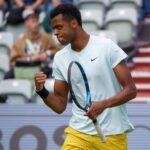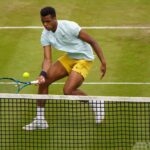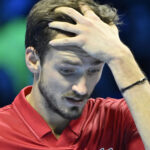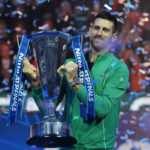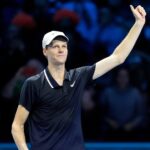Mpetshi Perricard: “I’m just doing my job, sending bombs in every direction”
Impressive on serve, Giovanni Mpetshi Perricard can also rely on his ability to manage his emotions and the identity he has found in his game thanks to his coach, Emmanuel Planque
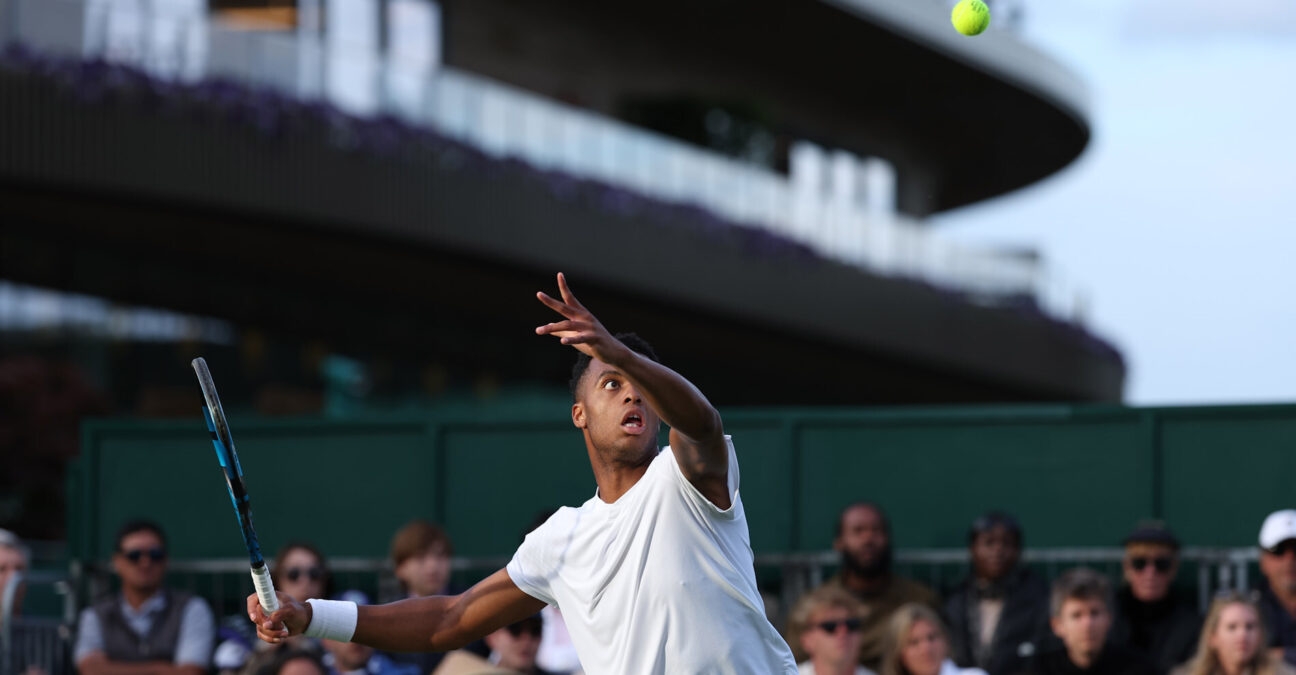 Giovanni Mpetshi Perricard, Wimbledon 2024 (Antoine Couvercelle/Panoramic)
Giovanni Mpetshi Perricard, Wimbledon 2024 (Antoine Couvercelle/Panoramic)
“I serve well…I do my job, sending bombs in every direction.”
It’s certainly a mission statement he’s sticking to. Since the start of Wimbledon, Giovanni Mpetshi Perricard, who has made it through as a lucky loser and reached the third round, has not lost a single service game (42 holds out of 42 service games). Only two other players have managed anything similar thus far, Alexander Zverev (25/25) and Brandon Nakashima (27/27) and he will aim to continue that streak when he takes on Finland’s Emil Ruusuvuori in the fourth round.
The leader in aces, 78, the Frenchman – who made 70 percent of his first balls (183/260), the 13th best total, just 5 percent behind the frontrunners Federico Coria (70/93), Alex Michelsen (131/175) – both of whom were beaten in the first round) and Alexei Popyrin (191/256) – is the most difficult man to return. Whether on his first or second serve, he is lighting the fuse and sending off a cannonball.
61 percent (112/183) of his first serves went unreturned. Only Zverev did better in this area, with 62 percent (58/92). Behind his second, 46 percent (29/64) of the serves hit could not be returned. One big server did better, Daniel Elahi Galan, with 48 percent (13/27), but he lost in the opening round. In comparison, Zverev managed just 18 percent (6/34) in this.
Reading these statistics, you could almost feel the frustration shown by Yoshihito Nishioka at his powerlessness in the face of the power – and precision – of the man nicknamed ‘Gio’.
“Yes, he really took out the fact that he was nervous,” replied the Lyon native. “It gave me even more confidence. Some people hide it a bit more. The fact that he showed it helped me. I said to myself: “I’ve got to keep going, be a steamroller, to step on him’.”
I try to pick and choose, to see how the best players do when the going gets tough, what they manage to do well.
Giovanni Mpetshi Perricard
Although the score was a resounding 6-4, 6-1, 6-2 against the 28-year-old Nishioka, who has won just four matches on grass since the start of his career on the main tour – which included one win over serve master John Isner at Wimbledon in 2021 -, it wasn’t all plain sailing. “I played my game well, even though it could have gone either way at the start of the second set,” he recalled. At 6-4, 0-0, 15-40, the 2.03m colossus had to save two break points against the Japanese left-hander, who is 33cm shorter. But he remained true to his character.
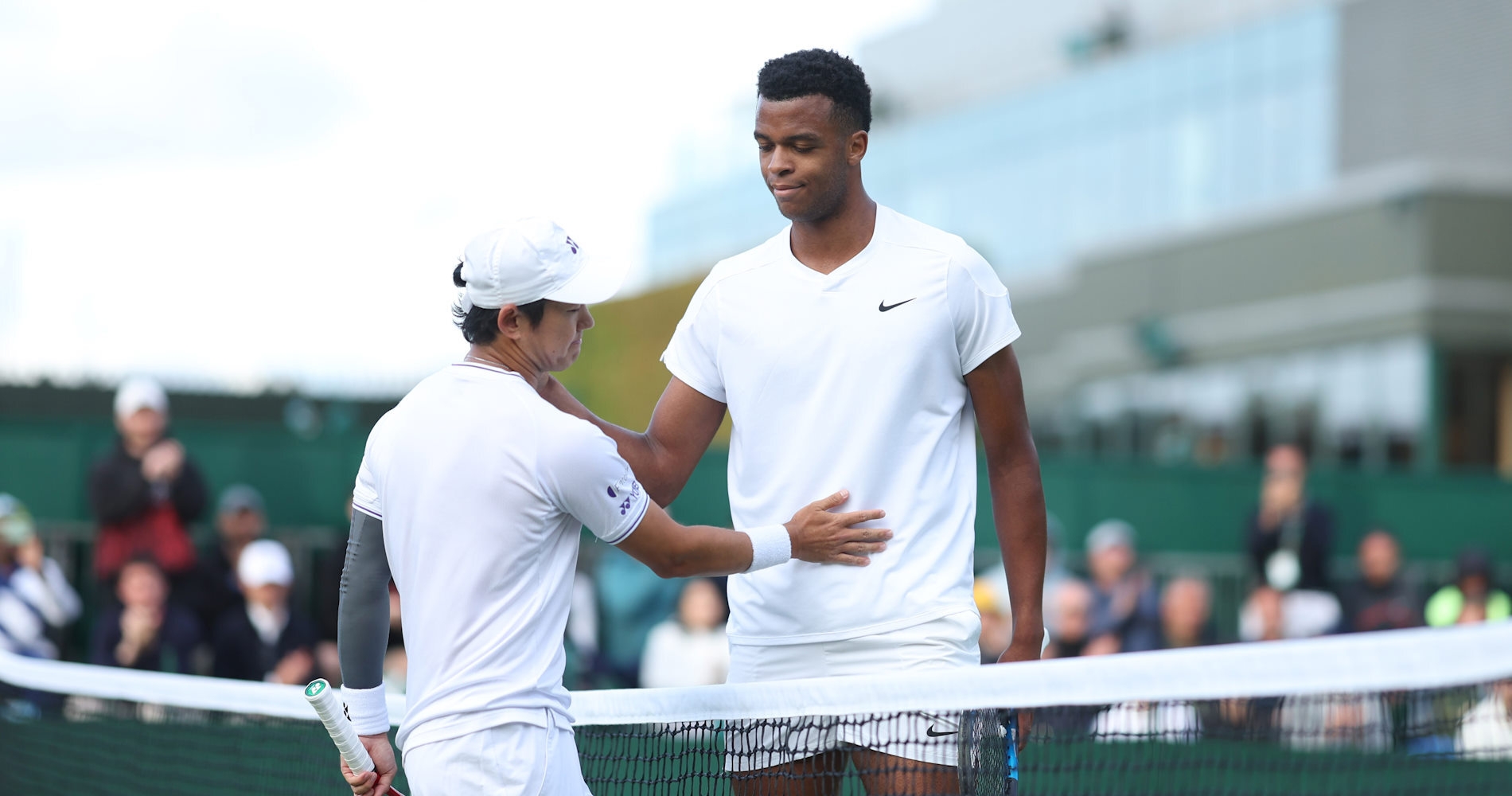
“I managed to stay calm,” he remarked. “And when he started to drop his head, I stayed the course.” From his first wins on the main circuit in Antwerp at the end of last season, through to his title on the clay of Lyon in May, he has had an impeccable attitude, his face almost as unreadable as a block of ice. “Almost’, because there was one indication in his eyes: his determination to beat his opponent.
In the clutch moments, he showed his ability to manage his emotions and not let himself be consumed – like when he was crowned champion in Lyon, or when he cracked an ace on a second serve at 6-6 in the third tiebreak in his 7-6, 6-7, 7-6, 6-7, 6-3 win over Sebastian Korda, seeded No 20, on the grass courts of the All England Club on Monday. Despite the pressure, the stress and the stakes swirling inside him, as they do in every player’s gut, he gave the impression that nothing could disturb him.
“Did I take my inspiration from (Jannik) Sinner (regarding keeping things in)? Yes and no,” he explained after defeating Nishioka. “I try to look a bit at the attitudes of the best. But everyone’s different. Sinner has his way, (Rafael) Nadal has his, and I have mine. I try to pick and choose, to see how they do when the going gets tough, what they manage to do well.”
Unfailingly calm
He added: “It’s pretty much always the same things: take your time, breathe, and they’re always focused when they start their move. These are things I’ve been looking at over the last few months, because it’s an aspect we don’t emphasise enough, and it helps enormously in preparing your game for the next point.”
“Mentally, I was solid from start to finish, I didn’t let any flaws or negative thoughts slip through. It’s not innate. Mentally, it’s not easy, I’m quite shy, very reserved. I didn’t want to show too much, so I had to work on that with people to help me become the player I am today and the player I want to be in a few years’ time.”
What kind of player does he want to become? “A player who will be complete, who will have no faults, whether mentally, technically or physically, who will respond to every problem.”
“I think I can do it, but before that I’ll need to put in a lot of hours of training.” He says he will particularly need to improve his one-handed backhand – with which he is already capable of unleashing some marvellous shots, but on which he has difficulty when the ball arrives fast and flat, particularly on the return of serve.
Working with Emmanuel Planque, his coach since 2022, he has been able to find his own game and prepare for the tennis of the future. While “GMP” was perhaps sometimes too inclined to build the point based on rallies from the baseline to imitate his favourite Nadal, Planque had to convince him to move towards a two- or three-strike style.
he’s beginning to understand that Rafa Nadal and his style of play will have to become an old dream.
Emmanuel Planque, Giovanni Mpetshi Perricard’s coach, to L’Équipe in October.
“His idol is Rafael Nadal, so I struggled a bit!… By talking to him more about (Mark) Philippoussis or players like that,” the coach told L’Équipe in October. “Between the image he had of himself and the requirements at the highest level and what he encounters, with the experience he gets when he trains with good players, all in all he’s beginning to understand that Rafa Nadal and his style of play will have to become an old dream.”
“I’ve made it a point of honour for Giovanni to have great technique. I wanted him to be technically sounds and not be hampered by the limitations of his height (…) I didn’t want him to have any big gaps. (…) He has to be able to start early, arrive on time and put a lot of pace into his first shots, whatever the ball. That’s what we want to move towards, because those are also the requirements of modern tennis.”
“His contemporaries are (Carlos) Alcaraz and (Jannik) Sinner, players who hit extremely hard. Obviously, when you’re serving at 225 km/h, you’re 2.03 m tall and the return comes back that fast, on the second shot you’d better be mobile to be able to get some distance and hit the ball properly.”
As his young player already knows, service is not everything. “I mustn’t rely on it too much all the time, because they (the players) are all trying to improve their shots,” he said, after beating Korda. “The balls are a little heavier, the surfaces a little slower, there are some long rallies and then you still have to have a strong enough base to make the difference.”
In short, Giovanni Mpetshi Perricard is well aware that those breezeblocks he’s sending down on serve are in fact just the first stones in the building of his game.
